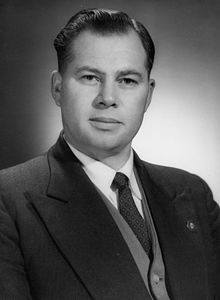Ron Bailey (politician)
|
The Honourable Ron Bailey QSO |
|
|---|---|
 |
|
| 21st Minister of Railways | |
|
In office 10 September 1974 – 12 December 1975 |
|
| Prime Minister | Bill Rowling |
| Preceded by | Tom McGuigan |
| Succeeded by | Colin McLachlan |
| Personal details | |
| Born | 15 December 1926 Napier, New Zealand |
| Died | 16 April 2015 Auckland, New Zealand |
| Political party | Labour |
Ronald "Ron" Leslie Bailey QSO (15 December 1926 – 16 April 2015) was a New Zealand politician of the Labour Party.
Bailey was born in Napier in 1926. He grew up in various public works camps and attended four different primary schools in the central North Island. He received his secondary education at Wairoa District High School (now Wairoa College) and Gisborne High School. His first jobs were as a clerk and a carpenter. He became a union organiser in 1956.
When Phil Holloway retired from the Heretaunga electorate, Bailey won the Labour Party nomination and the subsequent election. He served seven terms and retired in 1981, when he was succeeded by Bill Jeffries.
Bailey was Labour's junior whip from 1966 to 1972. He was Chairman of Committees from 16 February 1973 until 10 September 1974.
He was the Minister of Railways in the Third Labour Government and Minister of Electricity from 10 September 1974 to 12 December 1975, when National came to power.
Bailey was not a minister in the Fourth Labour Government, but was the convenor of the Backbone Club formed to support Roger Douglas against Jim Anderton.
Bailey struggled to find permanent work when he left parliament. He worked as a real estate agent for a while but found it hard to persuade people to take on high debt. For a while, he and his wife manufactured artisan chocolate at their home. He then became a review officer for the Accident Compensation Corporation (ACC) and went to retirement when he was 66. In the 1987 Queen's Birthday Honours, Bailey was made a Companion of the Queen's Service Order for public services.
...
Wikipedia
